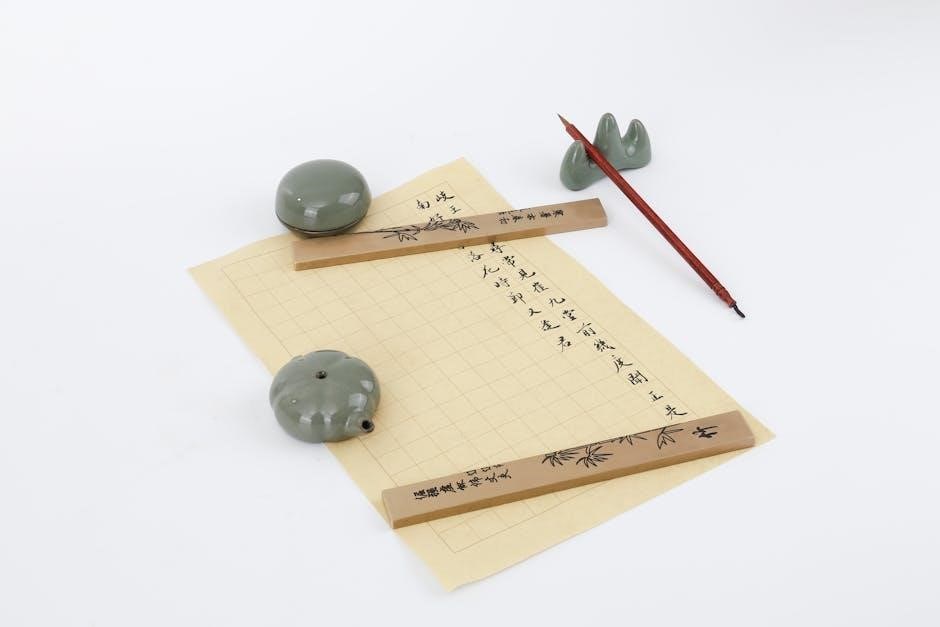Welcome to the AP Literature multiple-choice practice test, designed to help you master the exam format and content․ This section focuses on improving your reading comprehension, analytical skills, and test-taking strategies․ By practicing with realistic questions, you’ll gain confidence in tackling the actual exam․ The test includes a variety of question types, covering themes, character analysis, and literary devices․ Use this resource to identify strengths, address weaknesses, and refine your approach to multiple-choice questions․ Answers and explanations are provided to enhance your learning experience․

1․1 Overview of the AP Literature Exam Format
The AP Literature and Composition exam is divided into two main sections: multiple-choice questions and free-response essays․ The multiple-choice section lasts 60 minutes and contains 55 questions, testing your ability to analyze literary texts, identify themes, and understand stylistic elements․ Questions are based on excerpts from various works, including poetry, drama, and prose․ No points are deducted for incorrect answers, so it’s beneficial to attempt all questions․ The free-response section, lasting 120 minutes, includes three essays: a literary analysis, a passage analysis, and an open essay․ Together, these sections assess your critical thinking, reading comprehension, and writing skills․ The exam is scored on a scale of 1 to 5, with 5 being the highest․ Understanding this format is key to preparing effectively, especially with practice tests that mirror the actual exam structure․
1․2 Importance of Multiple-Choice Questions in AP Literature
Multiple-choice questions are a cornerstone of the AP Literature exam, serving as a critical assessment tool for evaluating students’ comprehension of diverse literary works and concepts․ These questions require rapid analysis, thematic identification, and recognition of literary devices, thereby enhancing analytical skills․ The timed nature of the multiple-choice section allows students to practice effective time management, a crucial strategy for success․ Additionally, multiple-choice questions encourage the development of test-taking strategies, such as eliminating incorrect answers and making informed guesses, which are vital for excelling in standardized tests․ The absence of penalties for incorrect answers motivates students to attempt all questions, fostering a proactive approach to testing․ By focusing on these aspects, multiple-choice questions not only refine a student’s understanding of literature but also prepare them for the demands of higher education, where similar skills are highly valued․

Structure of the AP Literature Multiple-Choice Section
The multiple-choice section consists of 55 questions, divided into sets of passages and standalone questions․ Each passage is accompanied by several questions testing comprehension, themes, and literary devices․ Students have 60 minutes to complete this section, emphasizing the need for efficient time management․ The format includes both prose and poetry excerpts, reflecting the exam’s focus on diverse literary works․ Points are awarded only for correct answers, with no penalties for incorrect choices, encouraging strategic guessing․ This structure evaluates a student’s ability to analyze texts, recognize literary elements, and think critically under timed conditions, mirroring the skills required for success in the AP Literature course․ Proper preparation ensures familiarity with the question types and formats, enhancing overall performance․
2․1 Breakdown of Question Types and Formats
The AP Literature multiple-choice section features a variety of question types, ensuring a comprehensive assessment of literary analysis skills․ Questions are divided into passage-based and standalone formats․ Passage-based questions present excerpts from literary works, followed by 4-5 multiple-choice questions that test comprehension, themes, tone, and literary devices․ Standalone questions focus on broader knowledge, such as identifying literary movements or analyzing quotes without context․ Some questions compare two passages, requiring students to synthesize information․ Each question is designed to evaluate critical thinking and close reading abilities․ The format also includes questions that ask about the author’s purpose, character motivations, and symbolic elements․ Points are awarded solely for correct answers, with no deduction for incorrect choices․ The diversity in question types ensures that students are prepared for the exam’s challenges․ Regular practice with these formats helps build familiarity and confidence․ Reviewing answer explanations enhances understanding of common pitfalls and strengthens test-taking strategies․
2․2 Time Management Strategies for the Multiple-Choice Section
Effective time management is crucial for acing the AP Literature multiple-choice section․ Start by quickly skimming through all questions to identify those you feel most confident about and tackle them first․ Allocate approximately one minute per question, as the section typically includes 55 questions within 60 minutes․ For challenging questions, eliminate obviously incorrect answers to improve your chances of guessing correctly․ Avoid spending too much time on a single question, as it can hinder your ability to complete the section․ Use the process of elimination to narrow down choices, especially for questions involving literary devices or themes․ Practice tests with answer keys can help you refine your pacing and decision-making skills․ Remember, no points are deducted for incorrect answers, so it’s beneficial to make educated guesses rather than leaving questions blank․ Prioritize accuracy on questions you’re certain about and manage your time wisely to ensure you attempt all questions․
Benefits of Using Practice Tests with Answers in PDF
Practice tests with answers in PDF format offer convenience and accessibility․ They provide clear explanations, enhancing understanding and retention․ PDFs are easily printable and sharable, making them ideal for self-paced study and review․
3․1 How Practice Tests Improve Exam Preparedness
Engaging with AP Literature multiple-choice practice tests significantly enhances exam preparedness by familiarizing students with the test format and content․ These tests simulate real exam conditions, allowing students to practice under timed constraints, which helps in refining their time management skills․ By regularly taking practice tests, students can identify their strengths and weaknesses, enabling them to focus their study efforts more effectively․ The process of analyzing incorrect answers and understanding the provided explanations fosters deeper comprehension of literary concepts and critical thinking skills․ Additionally, practice tests build confidence and reduce anxiety by acquainting students with the types of questions and passage analyses they will encounter․ Overall, consistent use of practice tests is a powerful strategy for improving performance and achieving success on the AP Literature exam․
3․2 Recommended Resources for AP Literature Practice Tests
To excel in the AP Literature exam, utilizing high-quality practice resources is essential․ The College Board offers official practice exams and study guides, providing authentic test questions and scoring guidelines․ The Princeton Review and Kaplan also provide comprehensive test prep materials, including multiple-choice practice tests with detailed explanations․ Additionally, Marco Learning offers a range of resources tailored to AP Literature, featuring practice tests in PDF format for convenient access․ Online platforms like Khan Academy and Magoosh further supplement preparation with interactive exercises and video tutorials․ For those seeking additional practice, user-friendly websites such as Course Hero and Scribd often host community-shared PDF guides and past exams․ By leveraging these resources, students can gain a competitive edge, familiarize themselves with the exam format, and refine their skills in a structured manner․ Consistent practice with these tools ensures a well-rounded preparation for the AP Literature multiple-choice section․

Answer Key and Scoring Guidelines

The answer key provides correct responses for multiple-choice questions, while scoring guidelines explain how points are allocated․ Reviewing both helps you understand your performance and avoid common errors in future tests․

4․1 Understanding the Answer Key for Multiple-Choice Questions
The answer key is a crucial resource for reviewing your performance on the AP Literature multiple-choice practice test․ It provides the correct answers to all questions, allowing you to identify where you may have gone wrong․ Each question is paired with its corresponding correct answer, making it easy to track your progress; Additionally, the key often includes brief explanations for each choice, helping you understand why a particular option is correct or incorrect․ By studying the answer key, you can gain insights into common pitfalls and refine your understanding of the material․ This tool is essential for targeted studying, enabling you to focus on areas where you need improvement․ Regular use of the answer key will enhance your test-taking skills and boost your confidence for the actual exam․
4․2 Common Mistakes to Avoid When Reviewing Answers
When reviewing your answers, it’s important to avoid common mistakes that can hinder your progress․ One major error is rushing through the answer key without thoroughly understanding each explanation․ Take the time to analyze why a particular choice was correct or incorrect, especially for questions you answered wrong․ Another mistake is ignoring the reasoning behind distractor options, which can help you recognize similar traps in future exams․ Additionally, don’t overlook the opportunity to learn from skipped questions; they often test key concepts you need to master․ Finally, avoid the habit of moving on without reinforcing what you’ve learned․ Use the insights gained from your review to create targeted study plans, focusing on weak areas and reinforcing strengths․ By avoiding these pitfalls, you can maximize the benefits of reviewing your answers and improve your overall performance on the AP Literature exam․
